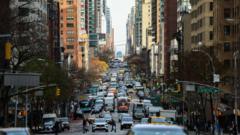New York City has officially introduced the United States' inaugural congestion charge scheme, targeting vehicles entering a designated area south of Central Park. Under this initiative, car drivers will pay up to $9 daily during peak hours for access to congested zones, while other vehicles will face varied charges based on their size and purpose. This area includes iconic landmarks such as the Empire State Building, Times Square, and the Wall Street financial district.
The city aims to alleviate its severe traffic disturbances and generate billions for its public transportation system. However, this newly launched charge has garnered resistance from various segments of society, including local politicians and residents; notably, Donald Trump has emerged as a leading opponent. The former president, a New York-born figure, declared his intent to revoke the congestion charge upon regaining office, highlighting concerns from local Republicans who have urged him to intervene in the matter.
Governor Kathy Hochul initially proposed the congestion charge two years ago, delaying its implementation to revise terms amid backlash from commuters and business communities. The latest revision reinitiates a halted plan she paused, citing potential "unintended consequences for New Yorkers." Despite pushback, including from taxi drivers' associations, the scheme proceeds as planned, with fees structured to account for small trucks and tourist buses as well.
On a broader context, New York City ranked as the world's most congested urban region for the second consecutive year in 2022, according to INRIX, a traffic-data analysis firm. The report revealed vehicles in downtown Manhattan barely reaching 11 miles per hour during peak morning hours. Amid ongoing debates surrounding traffic congestion and urban policy, New York's innovative congestion charge could signal a pivotal shift in managing urban mobility across the country.




















